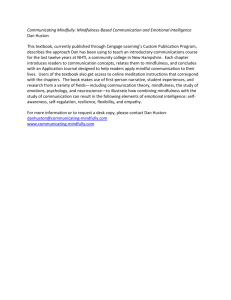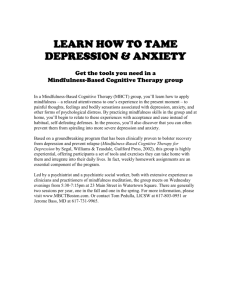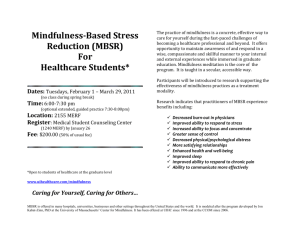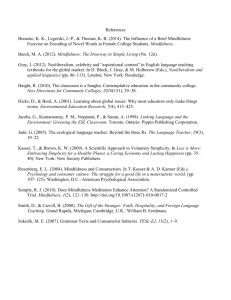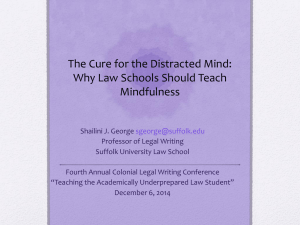Medical Education Registrar, Gold Coast University Hospital
advertisement
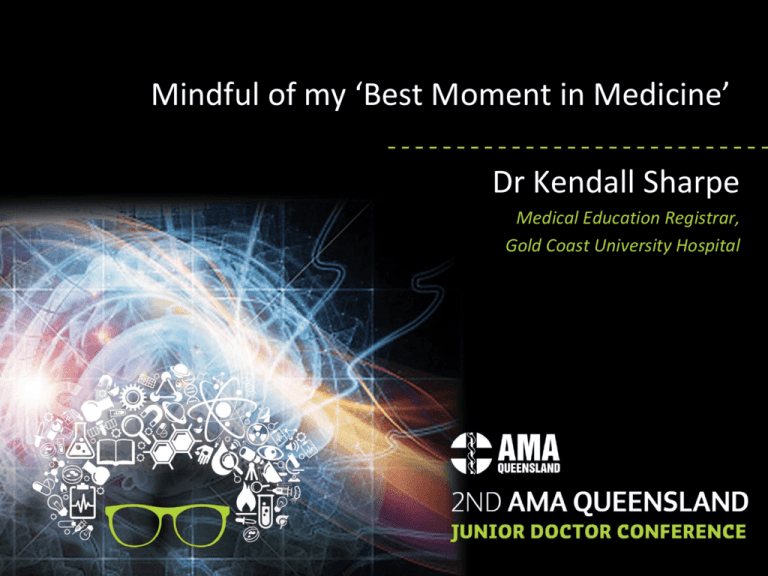
Mindful of my ‘Best Moment in Medicine’ Dr Kendall Sharpe Medical Education Registrar, Gold Coast University Hospital ‘Best’ Moment in Medicine (so far) • • • • • • Term 2 – my intern year (roughly 13 weeks into my medical career) Night shift in ED – slightly quieter normal Middle aged woman presents post choking episode – choked on a tablet Issue resolved by presentation to ED, had managed full meal since Several similar episodes previously (difficulty swallowing, voice changes) Had been investigated (although reluctantly) by her GP, referred to 2 x ENT specialists – diagnosed with ‘idiopathic vocal cord palsy’ – offered voice therapy • Although acute episode resolved – clearly anxious, forthcoming trip to Africa (life long dream)– worried she might ‘choke to death whilst on tour’, son in attendance – visibly concerned • Reassured myself of her present safety, referral for CT and swallow study, recommended follow up of test outcomes with new GP (for second opinion) • Referred to internal ENT department ‘Best’ Moment in Medicine (so far) • 7 weeks later – I am an intern in ENT • Patient presents with results of CT and swallow test, has sought the opinion of a second GP, (who has also referred the patient to the hospital ENT department) • Panendoscopy (+ biopsy) • Diagnosed with laryngeal adenoid cystic carcinoma – rare/accounts for less than 1% of all malignant tumours in the larynx • Surgical treatment – total laryngopharyngoesophagectomy (grossly morbid procedure) • Contact with this patient at several points during her hospital journey – first presentation to ED, review in ENT outpatient clinic, presence in the operating theatre and post-operatively on the ward, after hours ward call review on later readmission, case report preparation and presentation What I learnt from this patient My introduction to mindfulness • Working as a research assistant for the School of Psychiatry and Neuroscience during medical school • Assault in front of the hospital on my way to work • Difficulty with concentration/focus in that environment there after • Neuropsychology colleague (married to consultant neurosurgeon) suggested mindfulness training as the remedy – husband had enjoyed great success • Addressed the issues that I had related to that event but also unforeseen positive effects – Better engaged in work, study and relationships – Stress reduction/calming influence What is mindfulness? • • • • • Mindfulness is a concept borrowed from Buddhist psychology – first described 2500 years ago Though it has its roots in Buddhist meditation, a secular practice of mindfulness has entered Western mainstream in recent years, in part through the work of Jon Kabat-Zinn and his Mindfulness-Based Stress Reduction (MBSR) program, which he launched at the University of Massachusetts Medical School in 1979. Mindful practice involves ‘paying attention, on purpose, to one’s own mental and physical processes during everyday tasks so to act with clarity and insight,’ It ‘…leads the mind back from theories, attitudes and abstractions to the experience itself’ Mindfulness is a purposeful, non-anxious, reflective presence that can be applied to any aspect of practice – from playing a sport or an instrument through to medicine What has mindfulness got to do with medicine? • The physical and mental benefits of this sort of therapy are such that it has been adopted by countless programs in schools, prisons, hospitals, veterans centres, and beyond. • Prescribed for PATIENTS for the treatment of: – Depression (Barnhofer et al.) – Anxiety and bipolar disorder (Sipe et al) – PTSD – Substance Use Disorders (Marcus et al) – Progressive cognitive decline – patients and carers (Paller et al.) – Obesity (O’Reilly et al) – (Plus more and more applications everyday) What has mindfulness got to do with medicine? For CLINICIANS: For our patients • Increased density of gray matter in brain regions linked to learning, memory, emotion regulation and empathy • Fosters compassion and altruism - increases activity in neural networks involved in understanding the suffering of others and self compassion as well • As means of achieving more satisfactory practice for doctors – less error, better clinical outcomes For our colleagues • Improved relations with colleagues - could help address poor workplace culture, indifference to the feelings/experience of our colleagues which at its extremes leads to bullying, sexual harassment For ourselves • Enhanced immune function • Stress reduction • Treatment of our own mental illness (depression, anxiety) • Improved relations with our partners, friends and family • Eases doctor burnout and compassion fatigue • (reduced genetic ageing through its protective impact on gene expression and degeneration) How mindfulness contributed to my ‘Best Moment in Medicine’ • Having a present doctor is not the same as having a doctor who is ‘present’ • Its very easy to be distracted by the myriad of daily tasks in a hospital. • ‘When practicing mindfully, clinicians approach their everyday tasks with critical curiosity. They are present in the moment, seemingly undistracted, able to listen before expressing an opinion, and able to be calm even if they are doing several things at once. These qualities are considered by many to the prerequisite for compassionate care.’ (Epstein) • Mindfulness includes qualities that patients value in their medical practitioner including: – Attentiveness – Interest in the clinical problem – Interest in the patient as a person – Clinical judgement – Compassion – Presence How mindfulness applies to this case • Learning to apply the thing that had made my life better generally, to my practice of medicine • “Being” in the moment with the patient, observing not only the verbal/but non verbal clues that point to a diagnosis (her obvious physical symptoms, her anxiety surrounding her trip, the behaviour of her son who was clearly distressed by the pattern of these events and their effect on their family life) • “Active” thinking – avoiding the trap of ‘cognitive bias’ in a busy ED department • Releasing that is o.k. to behave like yourself (*as opposed to a high functioning auto-bot programed to diagnose, treat and discharge in minimal time - trademark© ‘iresident’ ) when interacting with a patient, not allowing system pressures to influence my relationship with the patient • Avoiding all these traps that could have contributed to poor handling of the patient • Appreciating that even though I can’t offer what my seniors can - I can offer a meaningful interaction, which is sometimes as important as treatment itself Resources for mindfulness • http://greatergood.berkeley.edu/topic/mindfulness/definition • http://www.pgme.utoronto.ca/content/mindfulness-medical-training • http://www.mindfulinmay.org/ • Many, many, many applications on i-tunes (527 to be exact!) Thank-you! References: Marcus MT, Zgierska A. Mindfulness-Based Therapies for Substance Use Disorders: Part 1 (Editorial). Substance abuse : official publication of the Association for Medical Education and Research in Substance Abuse. 2009;30(4):263. Barnhofer T, Crane C, Hargus E, Amarasinghe M, Winder R, Williams JMG. Mindfulness-based cognitive therapy as a treatment for chronic depression: A preliminary study. Behaviour Research and Therapy. 2009;47(5):366-373. Sipe WE, Eisendrath SJ. Mindfulness-based cognitive therapy: theory and practice. Can J Psychiatry. 2012; 57(2):63-9. Paller KA et al. Benefits of mindfulness training for patients with progressive cognitive decline and their caregivers. Am J Alzheimers Dis Other Demen. 2015 May;30(3):257-67 O’Reilly GA, Cook L, Spruijt-Metz D, Black DS.Mindfulness-based interventions for obesity-related eating behaviours: a literature. Obesity Reviews. 2014; 15(6): 453-61.
